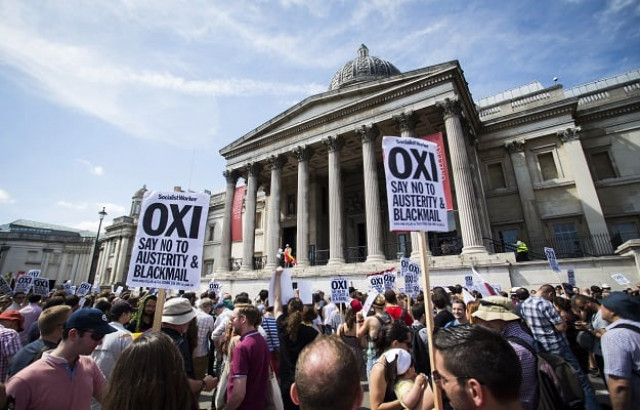Bailout conditions: Greece gears up for referendum
Prime minister calls for 30% cut on debt and 20-year grace period for the rest

An anti-austerity demonstrators attend a rally in Trafalgar Square in central London on July 4, 2015 in solidarity with those voting 'No' in Greece's forthcoming referendum. Greece braced itself Saturday ahead of a make-or-break bailout referendum as polls showed the 'Yes' and 'No' camps neck and neck and uncertainty rose over the future of the country's battered economy. AFP PHOTO
Greece was officially declared in default on Friday by the European Financial Stability Facility, which holds €144.6 billion ($160 billion) of Greek loans.
Athens has just missed an IMF loan payment deadline, the first time that has happened to an industrialised country. If it defaults on a July 20 payment to the ECB, Greece might have to withdraw from the 19-nation eurozone.
On June 27, Prime Minister Alexis Tsipras had called a referendum on whether or not to accept the terms of the latest round of bailout aid.
The IMF estimated that Greece needs €50 billion over the next three years, including €36 billion more from EU lenders, and debt relief to stabilise its finances.
Tsipras called for a 30% cut of the Greek debt and a 20-year grace period for the rest. The total Greek debt is €323 billion, or nearly 180% of its gross domestic product (GDP).
European Commission chief Jean-Claude Juncker has said that Greece’s negotiating position with creditors would be dramatically weakened in the event of a ‘No’ vote in the referendum.
Published in The Express Tribune, July 5th, 2015.
Like Business on Facebook, follow @TribuneBiz on Twitter to stay informed and join in the conversation.


1728020501-0/Express-Tribune-Web-(13)1728020501-0-208x130.webp)
















COMMENTS
Comments are moderated and generally will be posted if they are on-topic and not abusive.
For more information, please see our Comments FAQ